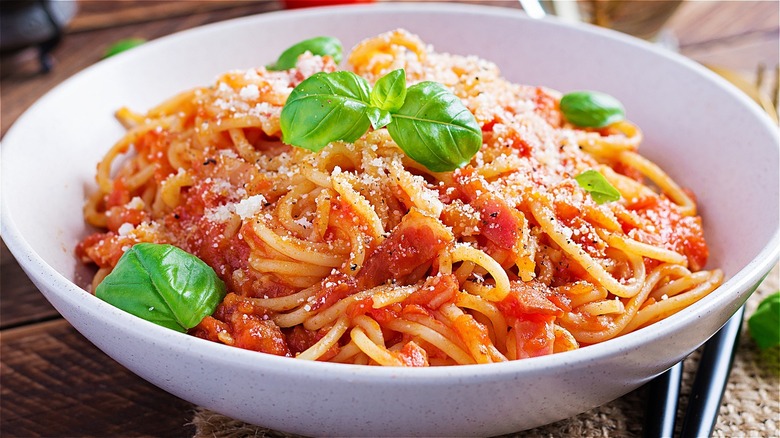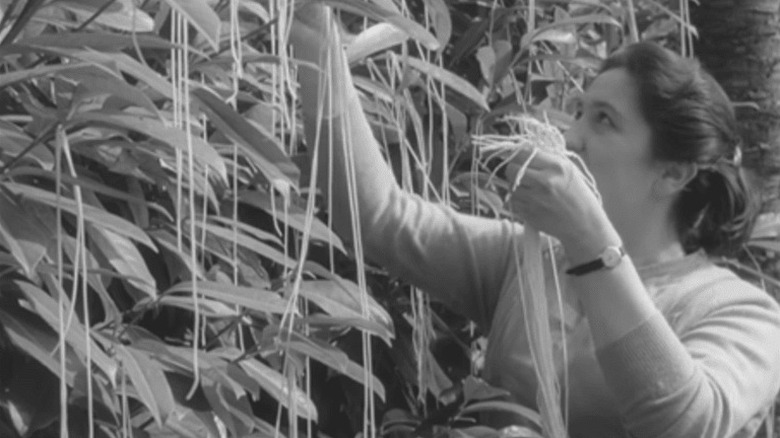The Day The BBC Said Spaghetti Grew On Trees
Picture yourself in Britain in the spring of 1957. You are sitting in your comfiest chair, nestled in to watch "Panorama" on the BBC starring the trustworthy Richard Dimbleby. The BBC calls this show an "investigative documentary series revealing the truth about stories that matter." If you hear something here, it must be gospel. The video shows a collection of budding trees as Dimbleby welcomes viewers to Ticino, a region in Switzerland along the Italian border. Apparently, this region is experiencing an early spring on the heels of a remarkably warm winter, which has "resulted in an exceptionally heavy spaghetti crop." Wait. What?
Dimbleby goes on to explain that the last two weeks of March are stressful for these pasta farmers, as frost can damage the spaghetti's flavor and prevent them from fetching the best prices for their product. You learn that cultivating spaghetti in Switzerland is much different from the large scale farming in Italy. It's more of a family affair. Your eyes marvel at the swaths of noodles hanging from spaghetti trees as Swiss maidens gently reap the harvest. Dimbleby asserts that the abundant yield is due to the sudden absence of the spaghetti weevil. He goes on to show the drying process, while saying that, thanks to the patient spaghetti plant breeders, they have managed to grow their crops in uniform lengths.
As the farmers enjoy a garden-to-table pasta feast, you are wondering what you have just seen. And you are right to wonder.
Welcome to BBC's first April Fools' Day hoax
First things first. Have you looked at your calendar? It's April 1, otherwise known as April Fools' Day. Surely, the BBC wouldn't be pulling your leg, would they? After all, the BBC has never engaged in hijinx. Until now. Yes, you and legions of other mentally sound British citizens have been duped by your most trusted source of information. Still, how could anyone believe that pasta grows on trees? One must remember that unlike today's pasta-literate audience, Brits during this time period weren't overly familiar with spaghetti and its origins. As All That's Interesting points out, pasta wasn't commonplace in the UK at this time and spaghetti usually came in a tin, like an early version of something whipped up by Chef Boyardee. For all they knew, this mysterious product could have grown on trees.
ARS Technica reports that even the BBC's director general, Sir Ian Jacob, fell for the prank. Jacob and his wife were so perplexed by this story that they decided to reference the day's leading source of knowledge — the Encyclopedia Britannica. Unfortunately, spaghetti was such a newfangled thing that it didn't even have an entry. Yes, even the BBC's biggest wig was fooled by his underlings.
Part of the joke's magic was that it looked so very real. Well, as real as a tree bearing noodles could look.
BBC's clever script proved very convincing
The idea originated in the mind of a cameraman on "Panorama," Charles de Jaeger. ARS Technica reveals he fondly remembered that one of his teachers used to chide, "Boys, you're so stupid, you'd believe me if I told you that spaghetti grows on trees," which lead him to believe that this would be the ideal April Fools' joke. David Wheeler, a "Panorama" producer, told BBC News they found an idyllic location in Switzerland, dressed some locals up in traditional attire, boiled some spaghetti, and draped it from branches. Wheeler added that Dimbleby's narration of the script "in his mellifluous tones," paired with the persuasive visuals and convincing prose, created what appeared to be an authentic broadcast. It really does sound like the real deal — even all these years later.
It certainly had the British public convinced. BBC was inundated with calls wondering how they, too, could grow a spaghetti tree. According to The Telegraph, the BBC's response was simply, "Place a sprig of spaghetti in a tin of tomato sauce and hope for the best." One can only wonder how many people actually put this advice to the test. If only it were possible to grow your own freshly-picked noodles for a garden-to-table dish of baked spaghetti or your favorite aglio e olio recipe. And if you're not sure where to plant your spaghetti crop, next to your money trees couldn't hurt!

